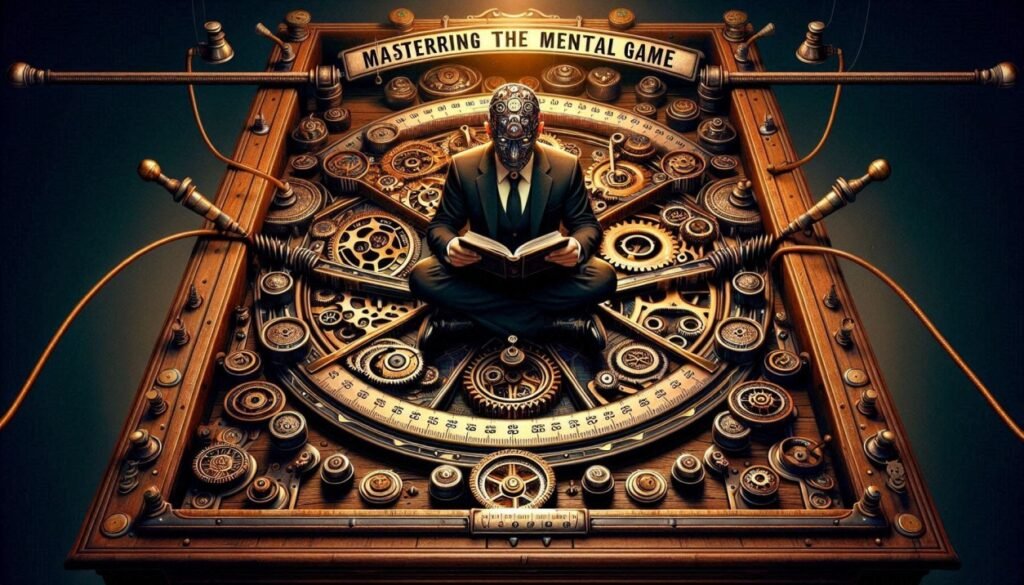Trading isn’t just about charts, indicators, and strategies. It’s a deeply psychological game where your mind can be your greatest ally or your worst enemy. Understanding the nature of your mental environment is crucial for navigating the ups and downs of the market and achieving consistent success.

The Mental Environment in Trading
Think of your mental environment as the landscape of your mind – a place where thoughts, beliefs, emotions, and memories reside. It’s the filter through which you perceive the market, interpret information, and make decisions. Just as a serene landscape can inspire tranquility, a turbulent mental environment can lead to impulsive actions and poor choices.

The Importance of Self-Awareness
Self-awareness is the cornerstone of mastering the mental game of trading. It’s about understanding your thoughts, emotions, and reactions to market events. Are you prone to fear when a trade goes against you? Do you get overly excited during winning streaks? Recognizing these patterns is the first step toward managing them.
Components of the Mental Environment
Your mental environment is a complex system with several key components:
- Beliefs: Your beliefs about the market, yourself, and your abilities shape your expectations and influence your decisions.
- Thoughts: Your thoughts are the building blocks of your beliefs. They can be positive, negative, or neutral, and they have a powerful impact on your emotions.
- Emotions: Emotions like fear, greed, hope, and despair can cloud your judgment and lead to impulsive actions.
- Memories: Your past experiences, both positive and negative, shape your beliefs and influence your emotional reactions.
The Role of Beliefs and Thoughts
Your beliefs act as filters, influencing what information you notice and how you interpret it. If you believe trading is a gamble, you’ll likely approach it with a different mindset than someone who sees it as a skill-based endeavor. Your thoughts, in turn, reinforce your beliefs. If you constantly think about potential losses, you’ll likely experience more fear and anxiety.
Emotions and Their Impact
Emotions are a natural part of trading, but they can be detrimental if left unchecked. Fear can lead to hesitation and missed opportunities, while greed can cause you to overtrade and take unnecessary risks. Recognizing and managing your emotions is essential for maintaining a clear head and making rational decisions.
The Inner vs. Outer World
The mental environment is your inner world, while the market is the outer world. Your brain acts as a processor, taking in information from the market and filtering it through your beliefs and emotions. This filtered information then shapes your perception of the market and influences your actions.

The Brain as a Processor
Your brain is constantly bombarded with information, but it can only process a fraction of it consciously. The rest is filtered through your subconscious mind, which is influenced by your beliefs, memories, and emotions. This subconscious filtering can lead to biases and blind spots in your perception of the market.
The Subconscious Mind
The subconscious mind is a powerful force in trading. It stores your beliefs, memories, and emotions, and it can influence your decisions without you even realizing it. Understanding and working with your subconscious mind is crucial for overcoming limiting beliefs and developing a winning mindset.
How the Mental Environment Shapes Trading
Your mental environment shapes your trading in several ways:

- Perception and Interpretation: Your beliefs and emotions influence how you perceive market events and interpret information.
- The Impact of Fear and Greed: Fear and greed are two of the most powerful emotions in trading. They can cloud your judgment and lead to impulsive actions.
- The Illusion of Control: Many traders believe they can control the market, but the reality is that the market is unpredictable. Trying to control the market can lead to frustration and losses.
Perception and Interpretation
Your perception of the market is not objective reality. It’s filtered through your beliefs and emotions. For example, if you’re in a losing trade, you might see the market as being against you, even if it’s just experiencing normal fluctuations. This subjective interpretation can lead to emotional reactions and poor decision-making.
The Impact of Fear and Greed
Fear and greed are two sides of the same coin. Fear is the aversion to loss, while greed is the desire for excessive gain. Both emotions can lead to irrational behavior and poor trading decisions. For example, fear can cause you to exit a trade prematurely, while greed can cause you to hold on to a losing trade for too long.
The Illusion of Control
Many traders believe they can control the market by using complex strategies or indicators. However, the market is ultimately unpredictable, and trying to control it is a futile endeavor. Accepting the market’s uncertainty and focusing on managing your risk is a more realistic and effective approach.
Mastering the Mental Game
Mastering the mental game of trading involves several key strategies:

- Self-Awareness Techniques: Keeping a trading journal, practicing mindfulness, and seeking feedback from mentors can help you become more aware of your thoughts, emotions, and reactions to market events.
- Cognitive Reframing: This technique involves changing the way you think about events to create a more positive and empowering perspective. For example, instead of seeing a losing trade as a failure, you can see it as a learning opportunity.
- Mindfulness and Meditation: These practices can help you become more present and aware of your thoughts and emotions, allowing you to respond to market events more calmly and rationally.
Self-Awareness Techniques
Self-awareness techniques are tools for understanding your mental and emotional patterns. Keeping a trading journal can help you track your thoughts, emotions, and decisions, revealing patterns that may be hindering your performance. Practicing mindfulness can help you become more present and aware of your thoughts and emotions in the moment, allowing you to respond to market events more calmly and rationally. Seeking feedback from mentors or experienced traders can provide valuable insights into your strengths and weaknesses.
Cognitive Reframing
Cognitive reframing is a powerful technique for changing your perspective on events. It involves challenging negative thoughts and replacing them with more positive and empowering ones. For example, instead of thinking, “I’m a terrible trader because I lost money today,” you could reframe it as, “I’m learning from my mistakes and becoming a better trader every day.”
Mindfulness and Meditation
Mindfulness and meditation are practices that can help you cultivate a calm and focused mind. Mindfulness involves paying attention to the present moment without judgment, while meditation involves focusing your attention on a single point, such as your breath. Both practices can help you reduce stress, improve your concentration, and make better trading decisions.
Building a Resilient Mindset
A resilient mindset is essential for navigating the challenges of trading. It involves:

- Embracing Uncertainty: The market is inherently uncertain, and accepting this uncertainty is crucial for managing your risk and avoiding emotional distress.
- Learning from Mistakes: Mistakes are inevitable in trading. Instead of dwelling on them, view them as learning opportunities and use them to improve your strategies.
- Developing Discipline: Discipline is the ability to stick to your trading plan and avoid impulsive decisions. It’s essential for managing your risk and achieving consistent results.
Embracing Uncertainty
The market is a dynamic and ever-changing environment. There are no guarantees in trading, and accepting this uncertainty is crucial for managing your risk and avoiding emotional distress. Instead of trying to predict the market’s every move, focus on developing strategies that can adapt to different scenarios.
Learning from Mistakes
Mistakes are inevitable in trading, even for the most experienced professionals. Instead of dwelling on them or blaming yourself, view them as valuable learning opportunities. Analyze your mistakes, identify what went wrong, and use that knowledge to refine your strategies and improve your decision-making.
Developing Discipline
Discipline is the cornerstone of successful trading. It’s the ability to stick to your trading plan, even when emotions are running high. Discipline involves managing your risk, avoiding impulsive decisions, and staying focused on your long-term goals.
The Role of Psychology in Trading Success
Psychology plays a crucial role in trading success. It’s not just about having a profitable strategy; it’s about having the mental fortitude to execute that strategy consistently.

- The Power of Positive Thinking: A positive mindset can attract opportunities and help you stay focused on your goals.
- Overcoming Limiting Beliefs: Identifying and challenging negative beliefs about yourself and the market can open up new possibilities for success.
- Building Confidence: Confidence comes from knowledge, experience, and a belief in your abilities. It’s essential for taking calculated risks and staying resilient in the face of setbacks.
The 3 Stages to Trader Success | A Roadmap for Aspiring Traders


